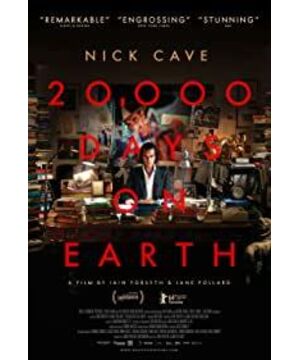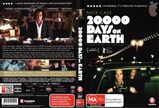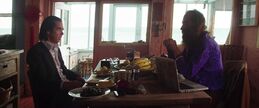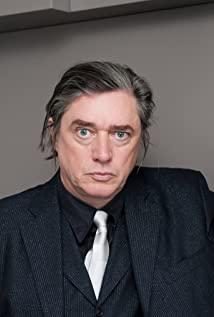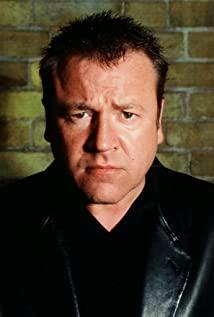that this year's Sundance Film Festival best film "20,000 Days on Earth" (20,000 Days on Earth) was released in the United States, which tells the story of a talented Australian rock artist, songwriter and poet What Nick Cave did on the 20,000th day on earth, the protagonist of the film is none other than Nick Cave himself.
Following the footage of directors Iain Forsyth and Jane Pollard, we got into the car with Nick Cave and started a journey through time and space through England, France and Australia.
The film begins with a wonderful three-minute montage: loud crying from Nick Cave's birthday, shuttle to the back of a 56-year-old skinny man in a suit, accompanied by a number on one side flipping from 0 to 20,000, followed by a black screen; when the screen lights up again, He is already in bed with his wife Susie Cave in their flat in the southern English town of Brighton.
"I get up, I write, I eat, I watch TV. This is my 20,000th day on Earth." This is Nick Cave's own answer.
Of course, on top of that, he's been writing and practicing songs, making appointments with friends, driving around, and visiting his psychiatrist. British psychoanalyst Darian Leader asked him what he feared the most. He thought for a moment and answered: loss of memory.
"We are memories. The depths of your soul and the only reason for your existence are bound by memories." He knew that for any writer, memory is the source of creativity. Knowledge of the past is our only path to the present. His narrative songs make up a whole world that, without exception, is created by "a memory worthy of our life-long pursuit, primitive and precious, and which defines our whole life."
Reader of "Lolita"
However, even the most experienced person is not able to openly share all memories with others, especially the traumatized part of the heart. At the age of 19, Nick Cave's father died in a car accident; dramatically, Cave was being arrested for theft at the time and locked in the police station waiting for his mother to come to bail. Darian Leader tries to talk about his father's death. "I was 19 years old." Cave's composure was no longer slack, and the pause between his words prolonged unnaturally: "Father's death was unexpected and shook the whole family." Then there was a tense and cold silence. Darian Leader stopped at this point: "Let's not talk about it?"
Even so, the memory of his father that he is always willing to share is the first chapter of "Lolita" that his father read to him when he was about to turn 12 years old. . "When he read 'Lolita' aloud, I felt like he became another man. He sublimated. It was as if I had been drawn into this mysterious world: a world full of sex, adulthood and art..." As for the "World Book Night" held in the UK in 2011, Nick Cave did not hesitate to choose this classic by Nabokov, which is also his sexual enlightenment reading.
The owner of the memory archive,
Nick Cave, is obsessed with recording memories, which drove him to open an archive of his own. You can find bits and pieces of his life in the rows of profiles. He read the will he wrote for the "Nick Cave Memorial" 30 years ago and couldn't help laughing: "I've always been a pretentious asshole." 40 years of ups and downs, the dust settled and condensed into rows of shelves of pictures and In the notebook, this measurable and digitized life seems to lack the uncertainty of the experience itself due to over-computation. But for Cave, who is afraid of losing his memory, his sense of security comes from having memories at his fingertips. Therefore, such a luxurious private archive has become so indispensable for this person.
The man who fell in love
In 1997, just after breaking up with the famous British rock star PJ Harvey, Nick Cave released a best-selling album "The Boatman's Call" inspired by this relationship.
Shortly thereafter, however, he met his current wife, Vivienne Westwood's former muse, British model Susie Bick. Cave describes his first encounter with Susie in the film: "The first time I met Susie was at the Victoria and Albert Museum in London. When she approached—those things I've been obsessed with over the years, pictures of movie stars, Jenny Eggert in a Billabong swimsuit, Anita Eckberg in the Trevi Fountain...Miss World, Marilyn Monroe, Jennifer Jones and Pod Rick...Moscow Ballet dancers in theaters and gymnasts in Russia...young girls in Wangaratta's pools lying on hot concrete, all that I've heard, seen and read...all the constant, never-ending IV erotica The data...everything came together at that moment, after a big, violent explosion and I fell. That's it."
Anita Eckberg's fountain shot from Fellini's Dolce Vita , which is also Anita Eckberg's best-known character, the sultry Swedish-American actress Sylvia. Coincidentally, Marcelo, a reporter who madly adore her in the play, also expressed the feeling of being electrocuted with the goddess: "Sylvia, you are really loved by thousands of people. You are Eve, you are mother, sister, lover, friend , angels, Satan, earth, home... yes, that's what it feels like: home!" - Nick Cave and Fellini's worship of women is exactly the same, right love is the catalyst for revitalizing experience, all the seemingly futile history , are carefully preparing for the accumulation of this moment.
change maker on stage
Halfway through the film, Nick Cave drives his Jaguar through the town of Brighton. During the process, several of his partners or friends appeared one by one: actor Ray Winstone, singer Kylie Minogue and former "Bad Seed" member Blixa Bargeld. They sat in Cave's car, chatting with him about life. Kelly Minogue and Nick Cave have collaborated on the best-selling hit "Where Are the Wild Roses?" They talked about the front and back of the stage, and their tacit understanding added: "The stage is the place where you can change." Like Nick Cave talked to a psychiatrist about one of the most important female singers of the human rights movement, Nina Simon, a performance that made him unforgettable: "Her murderous eyes just stunned the audience. She stuck the chewing gum in her mouth on the Then, she threw herself on the piano keyboard and began to play in a stormy, fast-paced performance. This kind of performance is transformative." However, anyone who has watched Nick Cave's performance knows that this kind of stage The captivating power and transformative nature of the man were also fully fulfilled in himself.
In recent years, there have been many documentaries of rock legends on the screen, but what sets 20,000 Earth Days apart from the rest is that Nick Cave's mysteries aren't unraveled after the film's release. An hour and a half of montages, music, and words show Nick Cave's more puzzling complexity. Documentaries should not be just archives. Like Nick Cave's memory archives, of course, it's just an iceberg of the root of genius. corner.
View more about 20,000 Days on Earth reviews


